Student Spotlight: Joseph Sotile, USG President
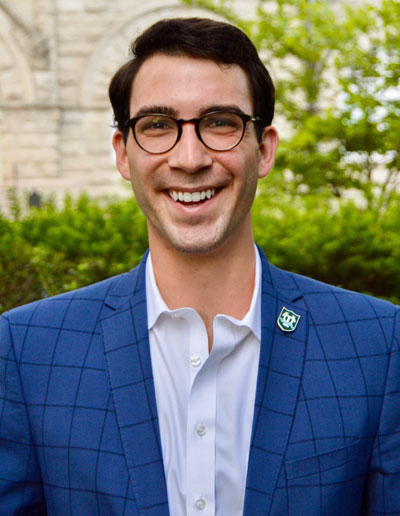
Tulane is a strong community that focuses on looking outward and providing innovative solutions to complex problems. Tulane students are continuously working to solve issues within our own city and around the globe. And since the release of the climate survey, a major focus for our community has been to end sexual violence on our campus. For all of us, this issue is deeply personal: I have seen too many classmates and friends impacted by the lingering effects of sexual violence. I knew that we had to meaningfully bring in more students if we were going to make a difference; every Tulanian must be engaged, and students are rising to meet that challenge. Tulane has come together as one community to combat sexual violence and create a safe and healthy environment on campus.
Tulane students are as active now in working to eradicate sexual violence on campus as they have ever been. The launch of the All In campaign created a platform for the voices of students, faculty, and staff. Together, we cohesively work to combine our energy and resources to reach our shared end goal.
My peers and I have been able to engage in multiple meaningful ways with the process of changing the culture on campus. All students are invited to join the Student Coalition for Sexual Violence Prevention and Response, which directly connects student voices with administrators to advocate for change. We have been able to engage with researchers studying sexual violence in communities of color and LGBTQ students on campus, since we recognize that these groups face unique challenges.
Organizations such as Sexual Aggression Peer Hotline & Education (SAPHE), Tulane University Peer Health Educators (TUPHEs), Community Engagement Advocates (CEAs), and One Love are not only expanding the conversation about this multifaceted issue but are also providing educational and transformative trainings for students, by students. Further, multiple organizations have changed their clubs’ policies to require their members to receive these student-led sexual violence prevention trainings to remain in the organization. These are just a few of the ways that we have started to shift our environment.
Every student deserves to feel welcome and safe at Tulane, and the burden of creating that community does not fall just on one department or group of students. All of us share that responsibility. Tulanians saw an injustice being perpetrated on our campus, and we took up the mantle to demand a transformation. I am dedicated to working alongside my fellow classmates to make sure every student has the student experience that they want. To this end, I am so proud of the work that we have done so far, but I know that there is more that we can do. We must listen to more voices, reach more students, and change the culture at Tulane. And together, we can.
SAPHE Becomes Part of Campus Health

The Sexual Aggression Peer Hotline and Education, also known as SAPHE has recently become a departmental organization under The Well for Health Promotion, part of Campus Health. We will miss our place in USG, but are excited about a fresh start working with The Well for Health Promotion! Making the decision to become a departmental organization wasn’t an easy one. SAPHE has been debating whether to switch for years now, but this time felt right. We think working with Campus Health will help SAPHE to grow and be more accessible on campus. The switch will not change much about how we run but instead will give us more resources to be the very best organization we can be!
As a new departmental organization, we will continue to provide a 24/7 peer support hotline run by caring and well-trained fellow students ready to direct you to campus and community resources. SAPHEs are trained in empathetic listening, HIPAA confidentiality requirements, and trauma-informed care. We will also continue to provide survivor support at events and host workshops! We have even begun to offer new workshops on consent, understanding the impacts of sexual violence, and how to support a survivor.
SAPHE is getting bigger and better every day. Throughout the year, we will be hosting various lectures, events, and activities around campus to get the entire Tulane community engaged in sexual violence prevention and response. We can be found tabling at McAlister and around campus often, so if you see us, please stop by! To learn more about SAPHE or to request a workshop, please email whp@tulane.edu or visit us at campushealth.tulane.edu/saphe.
Kennedy Williams
Class of 2020
Psychology Major
SAPHE Communications Coordinator
Faculty Spotlight: the Newcomb Institute’s Dr. Sally Kenney
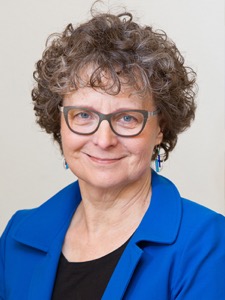
Since 2010, Sally J. Kenney has held the Newcomb College Endowed Chair at Tulane University where she is the executive director of the Newcomb Institute (NI), a Professor of Political Science, an adjunct faculty member in Public Health, and an affiliated faculty member of the Law School. She earned her M.A. and Ph.D. in Politics from Princeton University, a B.A. and M.A. in Politics, Philosophy, and Economics from Magdalen College, Oxford, and a B.A. in Political Science from the University of Iowa. She has published extensively about comparative employment discrimination, the European Court of Justice, and judicial selection, focusing particularly on women judges.
She has taught an undergraduate course on The Politics of Rape at Tulane for the last five years and has been a national leader on sexual assault on campus. She was one of the original planners of the Dartmouth Summit on Sexual Assault with David Lisak and Claudia Bayliff. She led a team of Tulane staff and students who attended that conference. Kenney was invited to the White House for the release of the It's On Us Report. NI has brought many leading researchers to campus to speak on their scholarship on sexual assault and assembled a consortium of faculty, students, and staff interested in working on the issue which evolved into the Sexual Violence Prevention and Education Committee, now dissolved. (See the All In website for more information about current committees and coalitions.)
The Newcomb Institute first screened the films Invisible War and The Hunting Ground which brought the film maker to town. Questioning following the screening of The Hunting Ground led Tulane to make more transparent its reporting of complaints that evolved into the Shifting the Paradigm annual event. NI hosted several trainings for faculty about changing requirements to report sexual assault on campus; it hosted Assistant Secretary of Education Catherine Lhamon for a campus convening in 2014. NI has sponsored two conferences for student activists on sexual assault. It is hosting a faculty research conference February 7, 2020. Kenney was an active member of the Sexual Assault Taskforce responding to Tulane University’s ARC3 climate survey which garnered over 50% response rate. She attended the Stanford Conference on Title IX Advocacy in the Trump Era. She served on the Tulane Sexual Assault Climate Taskforce and chairs the Provost’s committee on sexual harassment which changed the grievance procedure for faculty who are accused of sexual harassment. In the fall of 2018, she gave a keynote address at the University of Kentucky’s annual conference on sexual assault on campus and delivered an address at the University of Houston on sexual assault and restorative justice. In the spring of 2019, delivered a paper at the Stanford Institute of Behavioral and Social Sciences. In July, she gave a presentation and a poster at a three-day international conference on Faculty Academic Sexual Misconduct. She is currently writing her own survivor narrative.
In the 2019 Newcomb Summer Session, Kenney and Laura Wolford offered a one-week course for high school students on Dismantling Rape Culture.
She is currently writing, working to make her course available online, planning a series on sexual assault and restorative justice, and planning a national interdisciplinary conference of scholars.
Dispatch from the Roleplay rehearsal room – August 2019
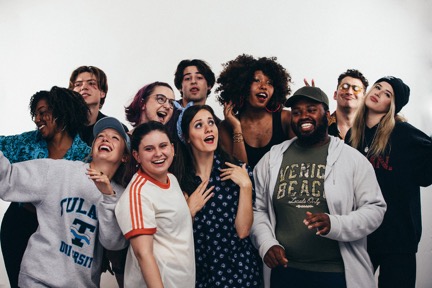
The good and the bad.
The funny and the heartbreaking.
The bitter and the sweet.
The violent and the tender.
The party and the homework.
As the Roleplay team completes its first week of rehearsals for a brand new theatrical work examining student perspectives’ on love, sex, power and relationships on Tulane’s campus, we find ourselves reflecting on the dual nature of college life. The stories in this production are so deeply real, so relatable, that audiences will find themselves laughing or crying or wringing their hands, and probably all three.
The background: Inspired by the startling results of the 2018 Tulane University Climate Survey on Sexual Misconduct, last year a team of student performers and New Orleans artists came together to start creating a new theatrical work, Roleplay, which will premiere on September 5th. The show examines a wide variety of student experiences on campus, with a focus on the social causes and reactions to sexual assault.
Roleplay features a stand-out group of student creator/performers, including Aaron Avidon, Carl Briggs Jr., Ross Brill, Alexandra Elam, Hannah Gordon, Grace Graughnard, Robert Holmes-Acourt, Miranda Kramer, Nagelle LeBoyd, Hailey Mozzachio, and Lucy Sartor. The show was also contributed to by Annalise Harknett, Noah Hazzard, Hannah Kent, and James Weiss.
Roleplay
September 5 - 15
Thursday - Saturdays at 8 pm, Sundays at 3 pm
Lupin Theatre
(150 Dixon Hall Annex)
Tickets are FREE but should be reserved in advance at www.goatintheroadproductions.org
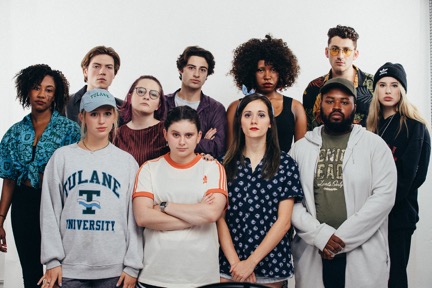
Adjunct Professor Darci Fulcher, filmmaker Katie Mathews, Tulane Professor Jenny Mercein, and artists from local theatre company Goat in the Road Productions have worked with 15 Tulane students to create this 90-minute show that follows 11 students through their Sophomore year of college. The professional team is as follows: Tulane Assistant Professor and Head of Undergraduate Acting Jenny Mercein and Goat in the Road members Shannon Flaherty (GRP co-Artistic Director), Denise Frazier, Darci Fulcher (Adjunct Professor at Tulane), and Chris Kaminstein (GRP co-Artistic Director). The design team includes Ellen Bull (costume), Owen Ever (properties), Kevin Griffith (set), Dylan Hunter (sound), Joan Long (lights), and Kit Sternberger (stage manager). Dr. Julia Fleckman, an Assistant Professor from the School of Public Health and Tropical Medicine, will be conducting evaluation surveys to measure the efficacy of Roleplay on shifting norms and attitudes on our campus.
In addition to the play, Roleplay also includes a documentary film directed by filmmaker Katie Mathews. Mathews and a team of student and professional filmmakers have followed the team as they build the live show, documenting the creation process. The Roleplay film is scheduled to be released in the fall of 2021.
Roleplay is made possible by support from the Newcomb College Institute of Tulane University and the Donna and Richard Esteves Fund at the Newcomb College Institute, Campus Health’s All-In Initiative, School of Liberal Arts at Tulane University Lurcy Grant, Nancy Rebold and Matt Rebold, and a Carol Lavin Bernick Faculty Grant. Early development of Roleplay was sponsored by the Hangar Theatre AIRS Residency. Special thanks to the Tulane Department of Theatre & Dance.
Photo credit: Josh Brasted
Get Involved!
Every member of our community has a role to play in preventing violence. Whether you only have an hour a month to devote to this issue or you’re interested in a career in sexual violence, there are opportunities for you to get involved at Tulane. Check out the All In website’s Get Involved section to learn more!
Welcome New Staff
Over the past few months, Tulane University has been excited to welcome several new staff members who focus on sexual violence prevention and response. These include: Anthony Ciliberto, Health Promotion Specialist at the Well, who will focus on men’s engagement in sexual violence prevention; Jennifer Hunt, Assistant Director at the Well, who will focus on sexual violence prevention; Margaret Reynolds, Senior Health Promotion Specialist at the Well, who will focus on sexual violence prevention for graduate and professional populations as well as the downtown campus; Whitley Quan, Graduate Assistant at the Well who will focus on LGBTQ+ programming and outreach efforts; and Austen Williams, Case Manager at Case Management and Victim Support Services. We are also excited to welcome Petey Peterson and Rasheeda Bradley to the Office of Gender and Sexuality Diversity (OGSD). OGSD and the O have been important partners in our response and prevention work, and we are excited to work with their new staff.
What We’re Reading
Sexual violence is an issue that affects everyone in our Tulane community. You can learn more about what sexual violence looks like at Tulane by reading the results of Tulane’s climate survey. Then, take a broader look at sexual assault and intimate partner violence rates at universities across the U.S. as well as intimate partner violence among same-sex college couples in college. Another national study compared how sexual harassment and sexual assault impact college students. Recently, we’ve also been reading more about how sexual assault impacts male victims and victims with disabilities. If you are looking to dig deeper on any issue related to sexual violence, Howard-Tilton Memorial Library provides access to a large number of scholarly journal articles and books.
Finally, for a longer read, we recommend the book Confronting Rape: The Feminist Anti-Rape Movement and the State by Nancy A. Matthews. Matthews’s look at the history of the anti-rape movement and rape crisis centers in the U.S. provides an important lens for understanding the landscape of today’s anti-violence work. Matthews uses Los Angeles in the 1970s to the 1980s as a case study and examines the work’s origin in many of the social movements of the day, including second-wave feminism and the Chicano/a movement. Matthews illustrates several tensions that came to shape rape crisis centers and continue to play out in the anti-rape movement today: bureaucratic vs. collectivist leadership styles, adversarial vs. collaborative relationships with state institutions such as the police, and rape as an individual psychological trauma vs. rape as a form of gender oppression.
In popular culture, Netflix will release a new series this month, Unbelievable, inspired by the true story of a rape victim charged with filing a false report but later shown to have been the victim of a serial rapist. Watch the trailer here and then read the Pulitzer Prize-winning article that inspired the series. This American Life also examined the story in a podcast episode entitled The Anatomy of Doubt.
Upcoming Events
Featured Event: Shifting the Paradigm
September 11, 6-8 p.m.
Dixon Auditorium
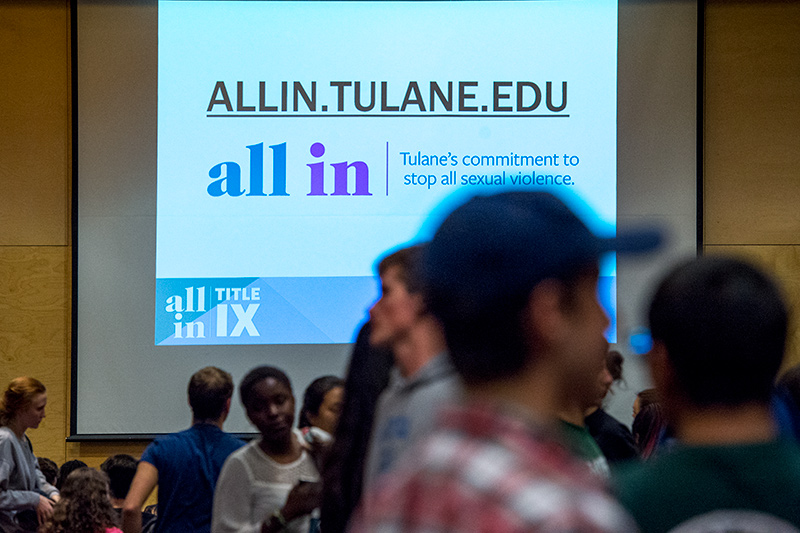
The 5th Annual Shifting the Paradigm is an opportunity for Tulanians to come together to learn about the impact of sexual violence on our campus and communities. Meredith Smith, Assistant Provost for Title IX and Clery Compliance, will share campus sexual misconduct data from the past year, and Dr. Dan Tillapaugh will provide a keynote address. Dr. Tillapaugh conducted research over the past year on sexual misconduct within LGBTQ communities at Tulane and, in his professional work, focuses on intersectionality and social contexts of higher education, college men and masculinities, LGBT issues in higher education, and leadership development and education. Students, faculty, and staff are invited to attend and learn how we can play our part in cultivating a culture of respect.
MENtality Project Lunch & Learns
A program designed to educate, empower, and connect individuals with topics focused on healthy masculinity and resources. Lunch & Learns will be occur throughout the fall semester from 12:30-1:30 p.m. to help students develop an understanding on what the MENtality project is and what can be expected in the upcoming semester. Lunch & Learns will include a FREE lunch, program overview, and activity and will take place Sept. 24, Oct. 15, Oct. 22, Nov. 5, and Nov. 12 from 12:30-1:30 p.m. Registration is required for these events. Please visit the Campus Health WaveSync page.
Fridays at Newcomb: Mary Koss
October 4, 12-1 p.m.
The Commons, 3rd floor, Diboll Gallery
Annual USG Town Hall on Sexual Violence
October 15, 6:30-8:30 p.m.
Qatar Ballroom, Lavin-Bernick Center
